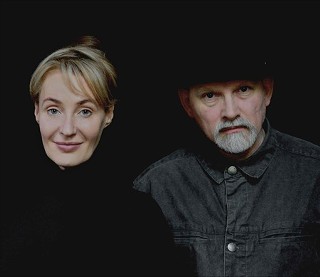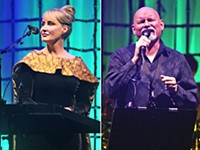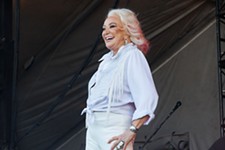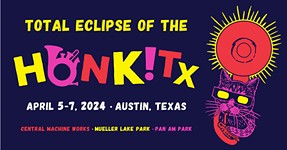Return of the She-King
In-depth Q&A with Dead Can Dance hypnotist Lisa Gerrard
By Raoul Hernandez, 11:17AM, Thu. Sep. 6, 2012
In 1973, Brendan Perry's family emigrated from London to New Zealand. Birthed eight years on in Melbourne with native siren Lisa Gerrard, Dead Can Dance moved to the UK where the couple alchemized world-pop exotica culminating on 1996's Spiritchaser. Reunited at the Moody Theater Friday for Anastasis, DCD offered up oracle Lisa Gerrard.
Austin Chronicle: Has Dead Can Dance ever played in Austin?
Lisa Gerrard: I don’t think we have. To be honest, I can’t remember. We’ve done so many thousands of concerts in America. I don’t think it was exactly Austin, but I do believe we played not too far from there. It all becomes such a blur, especially back in the early days when you’re sleeping on a bus and you just turn up in a place and do five shows in a row. It’s insane. Just a blur. Actually, it’s really unrealistic and really silly to do it like that, but you have to, because you just don’t have the budget to do it differently.
AC: LL Cool J famously said, “Don’t call it a comeback.” Is Anastasis a comeback for Dead Can Dance?
LG: “Don’t call it a comeback,” how funny. I don’t think Brendan and I really knew whether we’d ever work together again. It was one of those things where our lives moved into a completely different area. We drifted apart because I was living in Australia and Brendan was living in Ireland, where previous to that we’d always lived in very close proximity to each other, whether in the same house or very near to each other.
So our communication and our interests in philosophy and history and painting and walks and movies [fell away]. It was very much an integral part of our communication and the things that were influencing the way we wrote music. We, of course, have explored a lot of various Mediterranean traditional pieces. We were both heavily influenced by that as children because we grew up in immigrant areas. Well, I did especially.
Then Brendan and I developed a real love for Arabesque music, which found its way into our music from the point of view of exploring the very different rhythms, because we really wanted to break out of the box of just staying with a four-four [beat] and explore what it was that made that piece of music uniquely different from Western music.
That became something that caught our attention and we explored. Because you have to understand that when you do this work it’s like an apprenticeship. You have a love for the work of music as something that drives you, but then there’s no one to teach you how to find your own unique potential. So usually you’re driven by things that inspire you as a tutorial if you like.
AC: You say you didn’t know whether you and Brendan would ever play together again. What prompted this new album then?
LG: It was interesting, really, because we got to talking. Brendan contacted me around the time of the bush fires in Australia, because he could see on television that the area I lived on was burning. So we rekindled our friendship again after we’d had a falling out during the last concert tour. It didn’t finish in a good place. There were things happening dynamically within the work place that created lots of pressure and lots of problems. It wasn’t really to do with the work at all. It was really a personal crisis.
That’s the thing with Brendan and I. Even though we’ve always had our problems when it’s come to our personal relationship, we’re both very single-minded about how we need our art to be, and what it has to suggest. We find it almost impossible to compromise, but in the music itself, the harmony between us – the olive branch of friendship, if you like – and the ability to find balance and unification is matched by few others. We really do have a wonderful ability to collaborate together.
AC: About that collaboration, I felt the new song “Amnesia” really misses your voice. Is it the case that his songs are his songs and yours are yours and never the twain shall meet?
LG: Yeah I know, I thought that too. I think he was very careful about introducing my voice. What you have to understand is that Brendan and I have had to rebuild a bridge of trust. After us not working together, we had to walk towards each other very gingerly to make this album, because we really wanted to see what we could make together without ruining it with our personal problems. So it was a bit tentative at times. But I think that those things are healing now, and that with time we will re-find that place where we can sing more in the same pieces. We definitely do that live – sing together in the same pieces.
AC: The title of the new album is Greek, correct?
LG: Yes. Yes, it is. It’s about resurrection and rebirth. If you look at the album cover, it's self-descriptive in that it's really about the circle of life – that there’s still life within a sleeping sunflower and depending on the environment that new things will come. So it’s a really good descriptive analogy for creation, for music, for where we are as human beings on the planet.
If you tune into some of Brendan’s lyrics, it sort of encounters those things too. When he sings about opium, he’s not actually singing about drugs. He’s singing about the things that make us sleep, the things we’re no longer connecting to. And also “Amnesia,” the fact that we’ve forgotten all these years of history and things that have happened and we’re still not learning. So it’s all interconnected.
AC: New song “The Return of the She-King” could be about you even though you never went away, but in the context of Dead Can Dance, it felt like a stamp of your return.
LG: That’s funny. That’s really sweet. Well, it’s funny how these things come up through the unconscious. There’s definitely a lyrical, kind of mythological side to that piece, which probably came instinctively from some of the more lyrical and mythological pieces that I’ve been engaged in while doing cinema, which ultimately would have influenced Brendan as well regarding me. So, it’s quite complex when you try to get down to analyzing why this work is there and where it comes from.
It very much depicts who you are in your interior world and the things you’re experiencing through abstract responses to reality. That’s what music is. As a result of that, it opens up in a cathartic way the imagination and the heart pathway of the other. Music enables people to look inside themselves. So of course there are lots of things that influence the work, our own life experiences.
The fact that I’ve been doing movies, too; I know that’s changed some of the approach that I take to the work. It’s interesting to see how things evolve over the years. Ultimately when I listen to those songs and I listen to the new album, to me it’s just part of the same journey that we’ve been on since we met when we were 17 years old.
AC: Has working on soundtracks and working in film changed your approach to music?
LG: Well, I find doing music for film really, really exhausting. It’s a wonderful experience, but you have to write a lot of music that has to work within the subtextual reality and space and time emotionally of what the director wants to create in terms of a kind of abstract literary sense. It’s very, very specific, plus you have to create the atmosphere and poetry.
As an artist, that’s what you bring, but you still have to unlock the subtext and tell the story that the director wants to tell with the music. It’s really tricky. For me, it’s easier to write songs, because you’re not having to invert and redefine and recreate what it is you do as a very singular entity.
In film, you have to walk together as a team with the photography and the actors and the director and the light. It’s all relevant. There’s a huge discipline. Even though you can write something that’s quite abstract or even work with sound design, it still has to work with picture.
Yeah, it really is a challenge, but I love it. I love doing it.
AC: Did the Whale Rider soundtrack change anything for you thanks to its critical and popular reception?
LG: I think so, but I think Gladiator was the one that really changed things for me, because it was such a huge blockbuster film. It really did change things – winning awards and things like that. I’ve won a lot of awards for Whale Rider as well. I really liked the fact that when I did that film I did it by myself and that it was really my own work – absolutely my own work.
I know that sounds a bit narcissistic, but sometimes as an artist you need to know that this is what you make, this is what you do. Working also with the discipline of actually having pictures there as well, it was a huge challenge to be completely alone doing that and I really loved it. It became very personal to me. Often when you’re doing these works where you’re collaborating, it’s still personal but it’s not the same as when you do it by yourself.
AC: Your singing is so unique. Often I don’t know what language you’re singing or even if it is a language. At what point in your development as a musician did your vocal style come into full focus?
LG: Well, I’ve been singing since I was a baby. I used to sing on the street when I was 12 years old. So to me, it’s always been in full focus. Whether others appreciated it or not, I really had no concern. I didn’t care whether other people liked what I was doing when I was a child. I just knew I needed to do it.
It’s amazing, because it was there from a really early age. So early that I can hardly even remember. I remember I had a piano accordion and I used to play and the music just came out of my mouth. I think I was never constricted by language, because I grew up in an immigrant area where I was inspired by things even though I didn’t understand the language. Sometimes I think that gave me permission to sing the way I do. I don’t really know.
All I know is that if I hear music, I respond to it with the utterings of the heart and that’s it’s not an invented language. It’s the utterings and groanings of the heart. It’s an emotional texture and it’s innately affected and connected to the music.
And if it’s not, if I’m not inspired to do that, or if I try to write those words down and read them off of a page, I can’t do it. It’s from another part of the being. It’s not from the brain, if you like.
AC: When Dead Can Dance started out, the term “World Music” was still rather nascent. Artists in Europe are exposed more to music of other cultures, but when your band was starting out, did you feel a void of exotic music that needed to be filled or that it needed to be broken out into the mainstream?
LG: Well, I don’t think you really make those decisions. When you're approaching this from the point of view of being an artist and you’re not trying to approach it as a career, it’s a completely different energy. By the way, I think it was actually Houston that we played in.
You bring a completely different currency to the way you work when you’re not trying to make a pop song, or you’re not trying to make something that you think will fit within a four-minute criteria so that it can be played on the radio. We’ve always had a much more classical approach to the way we write and haven’t lived within the constraints of whether it’s going to be popular or whether the big tune on the album is the first tune.
There’s never been that kind of formula. We’ve always gone from the point of view of the journey and the way that the music unfolds naturally, organically, and if it needs to be nine minutes then it’s nine minutes long. If it needs to be one minute long, then it’s one minute long.
AC: Given everything that’s gone into the new album, are you nervous about its accompanying tour?
LG: We’ve already had small things happen that you sort of think, “Gee, I wonder if we’re going to be able to keep going.” I think we have to be brave and we need to embrace humility and we need to be very gentle with each other. We need to be aware of that. I think if we can achieve that, then....
It’s just sometimes the hairline cracks appear when people are tired. We just have to be aware of that and be very careful not to allow our own personal electricity to get in the way, because it always comes from a type of electricity between Brendan and I. If we have a problem, it’s like an electrical storm. I can’t explain it in any other way. It comes purely from a source of passion that’s connected to the work, so we have to be careful of it, because it’s very strong.
These things can be really beautiful if they’re harnessed and the ego is used creatively to share from the source of love that you have in your heart and soul to share with others. But it can backfire on you if you allow your ego to get out of control, or if you indulge in narcissistic behavior, or the fact that you’re unwilling to compromise. So there are certain vanities that come into the picture and those can be a danger.
AC: Thanks for your time today, Lisa. I think Austin’s really looking forward to Dead Can Dance’s electrical storm.
LG: [Laughs] That’s beautiful. All right, darling, well we’re dying to get there. I can’t wait to get down there. It’s going to be amazing.
A note to readers: Bold and uncensored, The Austin Chronicle has been Austin’s independent news source for over 40 years, expressing the community’s political and environmental concerns and supporting its active cultural scene. Now more than ever, we need your support to continue supplying Austin with independent, free press. If real news is important to you, please consider making a donation of $5, $10 or whatever you can afford, to help keep our journalism on stands.
April 12, 2024
April 5, 2024
Dead Can Dance, Lisa Gerrard, Brendan Perry, Gladiator, Whale Rider, Spiritchaser, Anastasis










